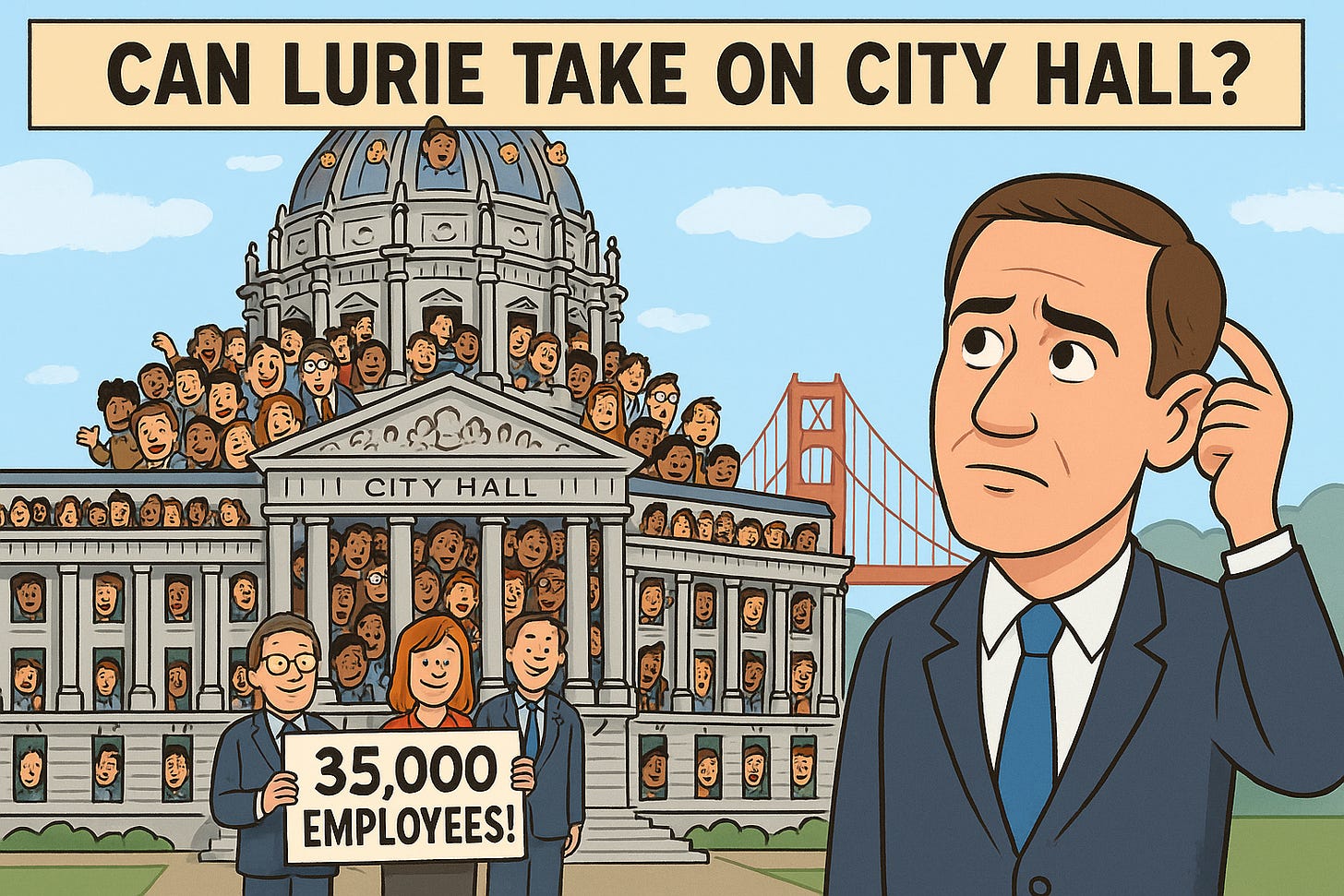Can San Francisco Be Saved From Itself?
Daniel Lurie’s moderate promises clash with a city drowning in ideological dysfunction. Can he deliver, or will the status quo swallow him up?
🕒 4.5 minute read
A City Choking on Its Own Excess
San Francisco has always fancied itself a laboratory for progressive ideas. This is a place where progressive theory gets its field test, often with little tolerance for conservative voices raising uncomfortable questions about results.
But walk the streets today, and the results speak for themselves.
Homeless encampments have become permanent fixtures along sidewalks throughout the city. The 2024 count tallied over 8,300 unhoused residents. The Tenderloin district continues to function as an open-air drug market, while overdose deaths climb year after year. This represents compassion deliberately severed from accountability, a hallmark of progressive governance prioritizing good intentions over measurable outcomes.
Progressive Intentions, Regressive Outcomes
This sprawling dysfunction flows naturally from unchecked progressive ideology, where every social problem spawns a new program, another department, and fresh layers of bureaucratic oversight. Effectiveness becomes secondary to the appearance of caring.
The economic picture tells an equally troubling story. Downtown office vacancy rates persist at 35.1 percent, ranking among the worst nationally. Storefronts sit empty as small business owners abandon ship, frustrated by a permitting process designed to protect inefficiency rather than promote growth. Meanwhile, the city operates on an absurdly bloated $15.9 billion budget that sustains overlapping agencies and commissions.
Police overtime consumed $108 million in fiscal year 2022-23, doubling the amount from five years prior.
Housing presents perhaps the starkest example of policy failure. CEQA, the state’s environmental review law, gets weaponized to block development across political lines. Permits drag on for months, lawsuits extend for years, and median home prices exceed $1.2 million. Wealthy donors fund bike lanes and green technology corridors while working families quietly pack up and leave.
The city spends hundreds of millions on homelessness programs annually. Yet only 13 percent of shelter residents transition into permanent housing. When policies designed to help instead seem to perpetuate suffering, one must wonder: whose interests get served? The unhoused themselves, or the vast ecosystem of nonprofits and public agencies that depend on the crisis continuing?
London Breed’s recent electoral defeat reflected voter exhaustion more than any particular scandal. Her tenure became emblematic of a city too pleased with itself to engage in honest self-examination. Yet changing the nameplate on the mayor’s door does not automatically change the policy direction.
The Illusion of Motion on Homelessness and Crime
Daniel Lurie arrived at City Hall carrying both promise and baggage. The Levi Strauss heir and civic philanthropist won office as a political outsider, pledging to restore basic order, common sense, and economic vitality. Now 200 days into his tenure, early signs inspire optimism and wariness.
His “Breaking the Cycle” homelessness plan promised 1,500 new shelter beds. Fewer than half exist, with current proposals yielding closer to 572 beds. A temporary triage center opened with fanfare, then quietly shuttered. New restrictions on recreational vehicle camping displaced some families without adequate follow-up assistance.
Regarding public safety, Lurie signed an executive order targeting 500 additional police officers and 160 sheriff’s deputies while establishing a task force to protect tourist corridors. Early crime statistics trend downward, though attributing this to his leadership remains premature. The real test lies in hiring those officers and navigating the bureaucratic maze that has stymied previous reform efforts.
Economic recovery shows tentative signs of life. Moscone Center bookings jumped 53 percent, and Lurie pushes adaptive reuse of vacant downtown buildings for housing. However, none of this matters if the underlying bureaucratic tangle remains intact.
Facing an $800 million budget deficit, Lurie chose the path of least resistance: contractor cuts and hiring freezes while leaving the massive municipal workforce untouched. Structural reform sits on the shelf, and public-sector unions prepare to resist anything more ambitious.
His 73 percent approval rating may reflect voter fatigue more than genuine enthusiasm. His promised CEQA reform package has barely launched, and critics warn that resistance from entrenched nonprofits and state-level allies will gut it before implementation.
Even his modified environmental agenda clings to expensive transit fantasies over street-level necessities. The comprehensive audits, sunset clauses, and department consolidations that genuine reform requires remain absent from his agenda—at least for now.
So, Does It Matter?
Lurie strikes observers as capable, sincere, and dedicated. Unfortunately, those qualities alone prove insufficient. Without directly confronting the bureaucratic establishment, breaking with the activist establishment, and making enemies within City Hall, he risks joining the long list of failed reform mayors.
San Francisco’s decline predates COVID-19, London Breed, and Daniel Lurie. It stems from decades of progressive policy implementation without meaningful accountability to results. This represents governance that mistakes symbolic gestures for substantive solutions.
Genuine leadership in San Francisco requires more than good intentions. It demands a willingness to challenge the deeply rooted progressive establishment that has captured the city government. Until a mayor proves ready to confront the bureaucratic priesthood, dismantle the self-serving “compassion industrial complex,” and impose accountability on a sprawling system designed to protect itself, San Francisco will remain less a city in recovery than a cautionary tale of what happens when ideology trumps evidence in municipal governance.
The question is not whether Daniel Lurie has the right intentions; the question is whether he has the political courage to act on them.




He'll slow the rate of decline, but a mayor can't remedy what ails SF. Leftism is too deeply engrained. You can't indoctrinate a generation of socialists who are anti-capitalism in government schools and then cement it in universities and not expect negative ramifications.